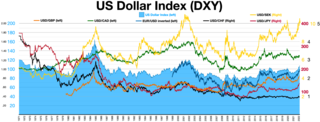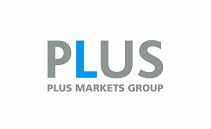
ISO 4217 is a standard published by the International Organization for Standardization (ISO) that defines alpha codes and numeric codes for the representation of currencies and provides information about the relationships between individual currencies and their minor units. This data is published in three tables:

The foreign exchange market is a global decentralized or over-the-counter (OTC) market for the trading of currencies. This market determines foreign exchange rates for every currency. It includes all aspects of buying, selling and exchanging currencies at current or determined prices. In terms of trading volume, it is by far the largest market in the world, followed by the credit market.
A foreign exchange spot transaction, also known as FX spot, is an agreement between two parties to buy one currency against selling another currency at an agreed price for settlement on the spot date. The exchange rate at which the transaction is done is called the spot exchange rate. As of 2010, the average daily turnover of global FX spot transactions reached nearly US$1.5 trillion, counting 37.4% of all foreign exchange transactions. FX spot transactions increased by 38% to US$2.0 trillion from April 2010 to April 2013.
A currency future, also known as an FX future or a foreign exchange future, is a futures contract to exchange one currency for another at a specified date in the future at a price that is fixed on the purchase date; see Foreign exchange derivative. Typically, one of the currencies is the US dollar. The price of a future is then in terms of US dollars per unit of other currency. This can be different from the standard way of quoting in the spot foreign exchange markets. The trade unit of each contract is then a certain amount of other currency, for instance €125,000. Most contracts have physical delivery, so for those held at the end of the last trading day, actual payments are made in each currency. However, most contracts are closed out before that. Investors can close out the contract at any time prior to the contract's delivery date.
A currency pair is the quotation of the relative value of a currency unit against the unit of another currency in the foreign exchange market. The currency that is used as the reference is called the counter currency, quote currency, or currency and the currency that is quoted in relation is called the base currency or transaction currency.

The Asian Clearing Union (ACU) was established on December 9, 1974, at the initiative of the United Nations Economic and Social Commission for Asia and the Pacific (ESCAP). The primary objective of ACU, at the time of its establishment, was to secure regional co-operation regarding the clearing of eligible monetary transactions among the members of the Union to provide a system for clearing payments among the member countries on a multilateral basis.

Michael Alan Spencer, Baron Spencer of Alresford, sometimes known as "Spens", is a British billionaire businessman and philanthropist. He is the founder of NEX Group, a UK-based business focused on electronic markets and post-trade business which was acquired by CME Group in November 2018. NEX Group was formerly known as ICAP, until the sale of its voice-broking business to Tullett Prebon in December 2016.

CME Group Inc. is a financial services company. Headquartered in Chicago, the company operates financial derivatives exchanges including the Chicago Mercantile Exchange, Chicago Board of Trade, New York Mercantile Exchange, and The Commodity Exchange. The company also owns 27% of S&P Dow Jones Indices. It is the world's largest operator of financial derivatives exchanges. Its exchanges are platforms for trading in agricultural products, currencies, energy, interest rates, metals, futures contracts, options, stock indexes, and cryptocurrencies futures.

NEX Group plc, formerly known as ICAP plc, is a UK-based business focused on electronic financial markets and post trade business for other financial institutions rather than private individuals. They are known as an inter-broker dealer. The company operates BrokerTec and EBS, respectively among the largest treasuries and foreign exchange markets in the world. NEX was listed on the London Stock Exchange until it was acquired by CME Group in November 2018.
U.S. Futures Exchange (USFE) was a Chicago-based, electronic futures exchange that terminated all exchange operations on December 31, 2008. On December 17, 2008, MF Global had announced USFE was for sale or would be closed by December 31, 2008. USFE was originally Eurex US who bought BrokerTec, but applied and received its own futures exchange license from the U.S. Commodity Futures Trading Commission. In October 2006, Man Group bought a majority share of Eurex US and rebranded the exchange U.S. Futures Exchange. It has been working to release a set of new products under a strategy of bringing innovation to the more than century-old derivatives business. The chief executive officer was John Spiegel.

TP ICAP Group plc is a financial services firm headquartered in London, United Kingdom. Its stock is listed on the London Stock Exchange and is a constituent of the FTSE 250 Index.
The interbank market is the top-level foreign exchange market where banks exchange different currencies. The banks can either deal with one another directly, or through electronic brokering platforms. The Electronic Broking Services (EBS) and Thomson Reuters Dealing are the two competitors in the electronic brokering platform business and together connect over 1000 banks. The currencies of most developed countries have floating exchange rates. These currencies do not have fixed values but, rather, values that fluctuate relative to other currencies.
LCH is a financial market infrastructure company headquartered in London that provides clearing services to major international exchanges and to a range of OTC markets. The LCH Group includes two main entities: LCH Limited based in London and LCH SA based in Paris.

PLUS Markets Group was a UK electronic stock exchange based in London for small cap companies that was acquired by ICAP in 2012 and rebranded as Icap Securities and Derivatives Exchange (ISDX). It was a market operator under MiFID Markets in Financial Instruments Directive, and was both a regulated market and a multilateral trading facility.

Matchbook FX was an internet-based electronic communication network for trading currency online in the Spot-FX or foreign exchange market. It operated between 1999 and 2002.
An E-micro is a futures contract traded on the Chicago Mercantile Exchange (CME) Globex electronic trading platform, that represents an even smaller fraction of the value of the normal futures contracts than the corresponding E-mini.

The Moscow Exchange is the largest exchange in Russia, operating trading markets in equities, bonds, derivatives, the foreign exchange market, money markets, and precious metals. The Moscow Exchange also operates Russia's central securities depository, the National Settlement Depository (NSD), and the country's largest clearing service provider, the National Clearing Centre. The exchange was formed in 2011 in a merger of the Moscow Interbank Currency Exchange and the Russian Trading System.

Midpoint is a UK headquartered, Toronto and Frankfurt listed company providing international payments and peer-to-peer foreign exchange services to individual and corporate customers. Midpoint is the world’s first dedicated peer-to-peer international foreign currency matching platform. The company's patented matching technology was the first application of peer-to-peer concept in the spot forex market.

David E. Rutter is an American financial services executive. He is the founder and CEO of enterprise blockchain technology company R3 and the founder and owner of US Treasuries trading platform LiquidityEdge.











